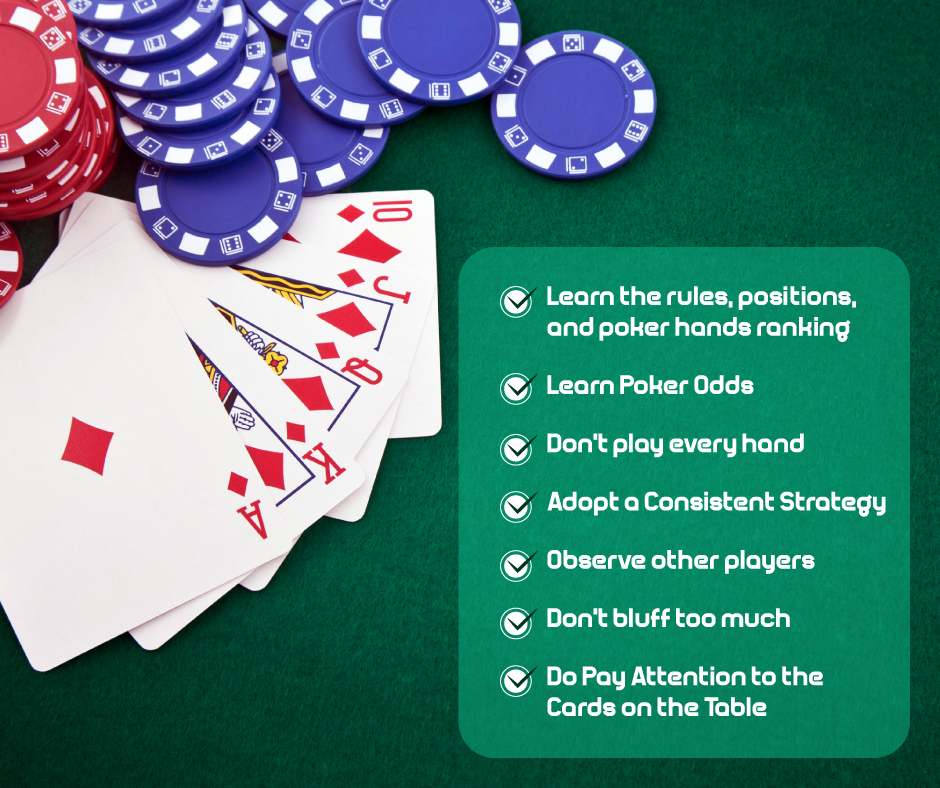
Poker, despite its image as a mere game for gamblers, is actually a game of skill. There’s a reason why there are professional poker players who play the game for a living, and it’s not because of sheer luck. People get to make money out of this game simply because they’re better than who they’re playing against.
It’s not about the cards falling your way all the time. No matter how unlucky you think you may be, you can actually make some decent money out of poker if you put in the work to study the game in order to get ahead.
Whether you want to pursue a career path in professional poker or you just want to crush your friends in your weekly poker nights, here are some tips to keep in mind that will surely help you win more.
Know the Winning Hands
Being familiar with the rules and the winning hands in poker is something that casual players can still miss. It’s not uncommon for someone to think that a straight beats a flush. Of course, you wouldn’t want to have the perfect read that your opponent has three of a kind and go all-in with two pair thinking that you have him dominated.
From worst to best, here are the hand rankings in poker:
- High card
- One Pair
- Two Pairs
- Three of a kind
- Straight
- Flush
- Full House
- Four of a Kind
- Straight Flush
- Royal Flush

Utilize Position Wisely
Position is huge in poker. Every round, there are players who are advantaged and disadvantaged just because of their position.
Those in late position have an advantage over those who have to act early because players who act later have more information. They can see whether the players ahead of them check or bet or re-raise and can therefore assess the strength of their hand in relation to the moves made by other players.
When playing poker, be more careful when playing in early position in order to not set yourself up to getting outplayed by the opposition.
Don’t Play Every Hand
It’s easy to get carried away when playing poker, especially when all the cards are coming your way. What’s better than cracking aces with 6-4, right? However, luck doesn’t last forever and it’s important to stay disciplined, especially preflop.
It’s essential that you’re selective with the hands you play and that you only play cards that have a good chance of making strong hands. Patience is key in poker. While it may seem boring to just keep folding for hours on end, it’s always fun to make money, and playing disciplined is the best way to win consistently on the tables.
Fold at the Right Spots
Just because you only play the strongest preflop hands doesn’t mean that you automatically win every hand you decide to play. Things can get awry pretty fast once the cards are on the board, and before you know it, your aces have a 0% chance of winning once the fourth card is on the board.
Folding is a skill in and of itself. It doesn’t mean giving up at all, so remember to set your ego aside when playing poker. In fact, folding correctly is actually a way of outplaying your opponent. Whenever you think you have a decent yet beatable hand, and it’s obvious that other players are more interested in winning the pot, don’t be afraid to make the right play by mucking your cards. Money saved is money won.
Only Bluff When Profitable
Bluffing is one of the most fun aspects of poker. Few things feel better than going all in with air and making your opponent fold in a huge pot. However, bluffing is also one of the easiest ways to empty your bankroll.
You should only bluff when you have a solid read on your opponent and you’re fairly certain that he will fold. There are players who don’t know how to fold at all and your air can get easily beat by the lowest possible pair despite your tremendous bet size.
Observe Your Opponents
The way other players play should influence the way you’re playing as well. As mentioned earlier, you should only bluff when you have a solid read on your opponent, and you develop these reads by observing the moves that they make on the table.
This is a great way of passing the time when you’re not playing in a hand. Folding doesn’t mean that you should just wait for the next hand. By observing other players, you get to see how others play and you can use this information to your advantage. For example, if you develop a read that someone bluffs too much, you wouldn’t be afraid next time to call with top pair when facing aggression from him.
Start at Low Stakes
Like any other skill-based endeavor, improvement comes from experience. In poker, it’s essential to play as much as you can while losing the least possible amount. To avoid gigantic losses, play at low stakes first.